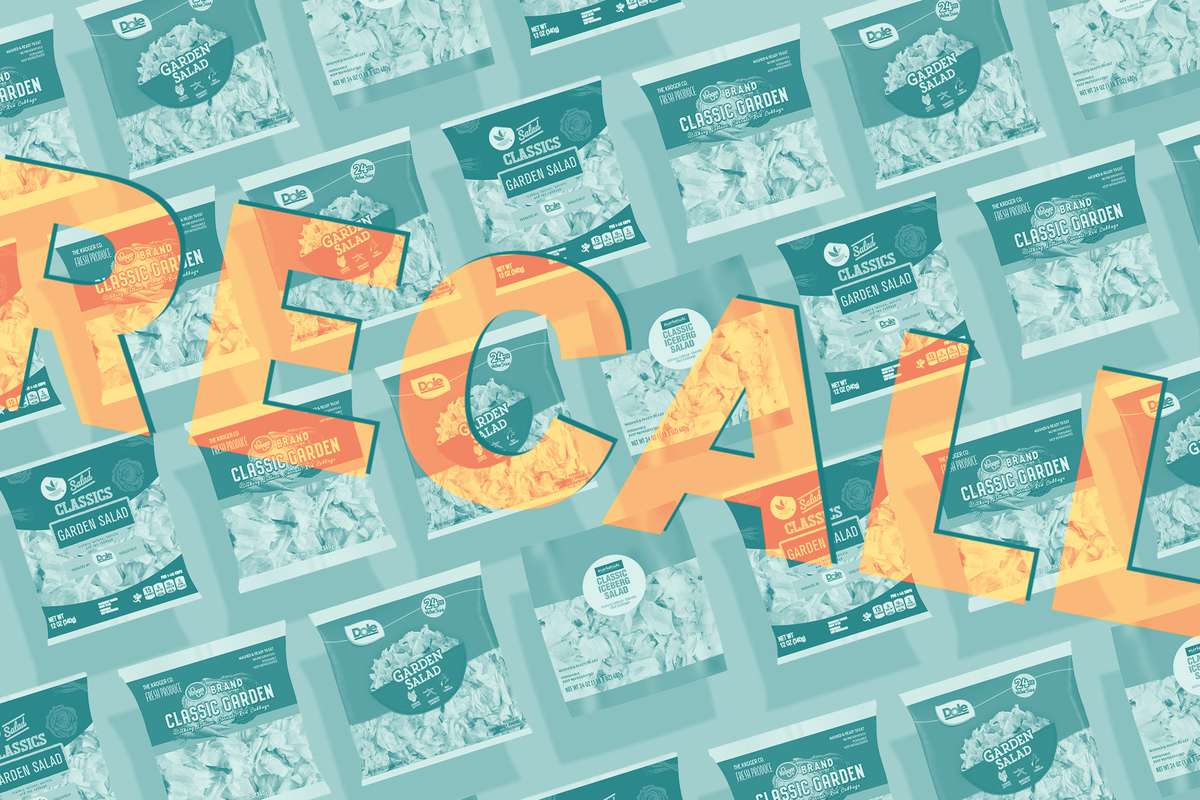


There's another massive food recall to have on your radar. Dole Fresh Vegetables, Inc., is voluntarily recalling all Dole brand and private label packaged salads that were processed at its Springfield, Ohio, and Soledad, California, production facilities containing iceberg lettuce over possible Listeria monocytogenes contamination.
Impacted products from the Ohio plant have a product lot code that starts with the letter "W" and a "Best if Used By" date between December 22, 2021, and January 9, 2022, according to the Food and Drug Administration (FDA). Products from the California location have a product lot code beginning with the letter "B" and a "Best if Used By" date between December 23, 2021, and January 8, 2022. The product lot codes can be found in the upper-right-hand corner of the package.
The impacted salads were shipped to 37 states and six Canadian provinces. Besides the Dole brand itself, impacted products also have branded labels of H-E-B, Marketside, President's Choice, Kroger, and Little Salad Bar. A full list of the impacted products—and the states they were shipped to—is listed on the FDA's website.
These particular products are being recalled after Dole tested equipment used to harvest the salad's raw iceberg lettuce and found that the equipment contained the bacterium Listeria monocytogenes, per the FDA. "Listeria—often present in the intestine of mammals and birds—leaves the animal's body through its stool where it can then contaminate leafy greens and other foods through the stool directly or via contaminated soil or water," Darin Detwiler, associate professor of food safety at Northeastern University, tells Health. In this case, listeria likely got into the soil and then the equipment that came into contact with it, he says. "Just like the food in the ground can become contaminated, so, too, can the equipment," Detwiler adds.
And because listeria "could potentially live for years on food processing equipment," testing the equipment, like Dole did, is important, Candice Christian, consumer and retail food safety expert at North Carolina State University, NC Cooperative Extension, tells Health.
This is not the first time Dole has recalled some of its products over listeria concerns. Last month, the company recalled 180 packaged salad products. And in November 2021, the company recalled four of its read-to-eat salads. In both cases, it was a bag of salad that had tested positive for Listeria monocytogenes that prompted the recalls.
Listeria can cause a serious illness called listeriosis, according to the Centers for Disease Control and Prevention (CDC). An estimated 1,600 people get listeriosis each year, and about 260 die annually from the condition. Pregnant people and their newborns, adults aged 65 or older, and people with weakened immune systems are most at risk, the CDC says.
Symptoms can vary, depending on whether someone is pregnant or not. In pregnant people, listeriosis will often cause fever, fatigue, and muscle aches, per the CDC. Infections in pregnant people can lead to serious pregnancy complications, including miscarriage, stillbirth, premature delivery, or life-threatening infection of the newborn.
In people who aren't pregnant, listeriosis symptoms may include:
- Headache
- Stiff neck
- Confusion
- Loss of balance
- Convulsions
- Fever
- Muscle aches
People with listeriosis usually develop symptoms anywhere from one to four weeks after they eat contaminated food, though some people may develop symptoms as early as the same day they were exposed or as late as 70 days after exposure, according to the CDC.
No illnesses have been linked to the most recently recalled products so far, the FDA reports. If you have any of the packaged salads in your fridge, the FDA urges you to not eat them and to throw them out immediately.
"While cooking these foods properly can kill the listeria bacteria, most people do not consume cooked leafy greens," Detwiler says. "Further, refrigerating the products won't kill the bacteria. If anything, the bacterial culture can actually grow while inside the refrigerator." You can't smell, see, or taste listeria in food, Detwiler says, which is why it's so important to make sure the greens that are sitting in your fridge aren't impacted by the recall.
If you think or know that you ate any of the impacted products, Christian recommends keeping tabs on your symptoms. If you develop signs of listeriosis, the CDC recommends contacting your doctor about next steps, which may include treatment with antibiotics.
Source: Read Full Article